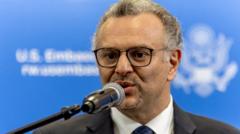President Trump has hinted at a potential softening of his stance on tariffs imposed on China while expressing support for Jerome Powell, the Federal Reserve Chair. Speaking from the White House, Trump conveyed optimism that trade relations with China could improve, suggesting significant reductions in tariffs but confirming they would not completely vanish. This evidence of negotiation appears to stem from concerns over the escalating trade war's impact on both national and global economies.
Trump Signals Shift on China Tariffs, Backs Fed Chair Amid Economic Turbulence

Trump Signals Shift on China Tariffs, Backs Fed Chair Amid Economic Turbulence
In a recent Oval Office address, President Trump appeared to ease his hardline stance on China and the Federal Reserve's leadership, revealing a more conciliatory approach in his economic policies.
The president underscored his desire for Powell to adopt a more aggressive approach towards interest rate cuts to stimulate borrowing for Americans. Trump's previous harsh criticisms of Powell, labeling him a "major loser," seemed to take a step back as he declared he has "no intention of firing" the Fed head. Markets reacted positively to Trump's latest remarks, with Asian stock indices showing gains and US futures trading higher as investors expressed relief at the prospect of trade negotiations.
Despite the optimistic tone, the economic landscape remains turbulent, impacted by Trump's tariff policies that have escalated to a staggering 145% on Chinese goods. The International Monetary Fund (IMF) has recently downgraded its forecasts for US economic growth due to uncertainties tied to these tariffs, predicting they will contribute to a significant global slowdown.
In response, China has retaliated with its own tariffs and has vowed to continue the fight against US trade policies. The ongoing situation teeters on a delicate balance, with the stakes high for both nations amid concerns about inflation and financial market stability. As the trade war continues to evoke challenges, the outcome of these negotiations may shape the economic future for both the US and China.
Despite the optimistic tone, the economic landscape remains turbulent, impacted by Trump's tariff policies that have escalated to a staggering 145% on Chinese goods. The International Monetary Fund (IMF) has recently downgraded its forecasts for US economic growth due to uncertainties tied to these tariffs, predicting they will contribute to a significant global slowdown.
In response, China has retaliated with its own tariffs and has vowed to continue the fight against US trade policies. The ongoing situation teeters on a delicate balance, with the stakes high for both nations amid concerns about inflation and financial market stability. As the trade war continues to evoke challenges, the outcome of these negotiations may shape the economic future for both the US and China.






















